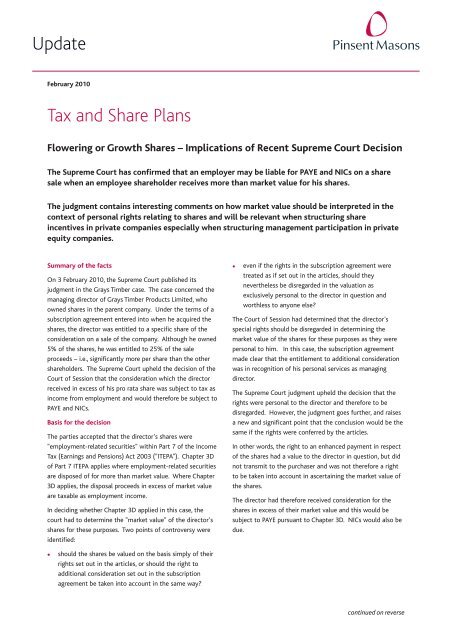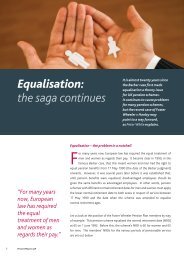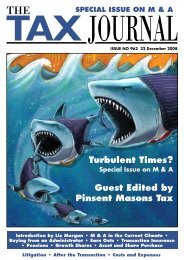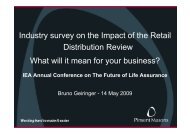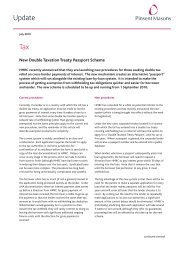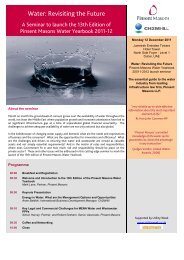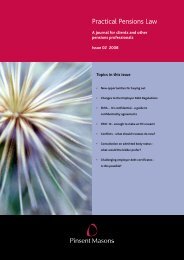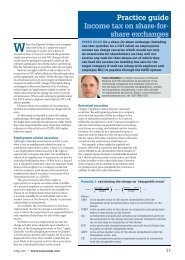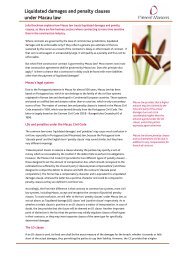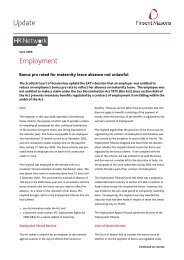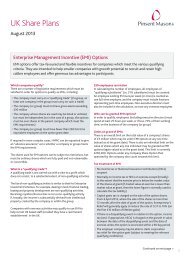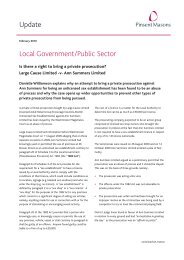Tax - Flowering or growth shares - FEB 10.qxd - Pinsent Masons
Tax - Flowering or growth shares - FEB 10.qxd - Pinsent Masons
Tax - Flowering or growth shares - FEB 10.qxd - Pinsent Masons
Create successful ePaper yourself
Turn your PDF publications into a flip-book with our unique Google optimized e-Paper software.
Update<br />
February 2010<br />
<strong>Tax</strong> and Share Plans<br />
<strong>Flowering</strong> <strong>or</strong> Growth Shares – Implications of Recent Supreme Court Decision<br />
The Supreme Court has confirmed that an employer may be liable f<strong>or</strong> PAYE and NICs on a share<br />
sale when an employee shareholder receives m<strong>or</strong>e than market value f<strong>or</strong> his <strong>shares</strong>.<br />
The judgment contains interesting comments on how market value should be interpreted in the<br />
context of personal rights relating to <strong>shares</strong> and will be relevant when structuring share<br />
incentives in private companies especially when structuring management participation in private<br />
equity companies.<br />
Summary of the facts<br />
On 3 February 2010, the Supreme Court published its<br />
judgment in the Grays Timber case. The case concerned the<br />
managing direct<strong>or</strong> of Grays Timber Products Limited, who<br />
owned <strong>shares</strong> in the parent company. Under the terms of a<br />
subscription agreement entered into when he acquired the<br />
<strong>shares</strong>, the direct<strong>or</strong> was entitled to a specific share of the<br />
consideration on a sale of the company. Although he owned<br />
5% of the <strong>shares</strong>, he was entitled to 25% of the sale<br />
proceeds – i.e., significantly m<strong>or</strong>e per share than the other<br />
shareholders. The Supreme Court upheld the decision of the<br />
Court of Session that the consideration which the direct<strong>or</strong><br />
received in excess of his pro rata share was subject to tax as<br />
income from employment and would theref<strong>or</strong>e be subject to<br />
PAYE and NICs.<br />
Basis f<strong>or</strong> the decision<br />
The parties accepted that the direct<strong>or</strong>'s <strong>shares</strong> were<br />
"employment-related securities" within Part 7 of the Income<br />
<strong>Tax</strong> (Earnings and Pensions) Act 2003 ("ITEPA"). Chapter 3D<br />
of Part 7 ITEPA applies where employment-related securities<br />
are disposed of f<strong>or</strong> m<strong>or</strong>e than market value. Where Chapter<br />
3D applies, the disposal proceeds in excess of market value<br />
are taxable as employment income.<br />
In deciding whether Chapter 3D applied in this case, the<br />
court had to determine the "market value" of the direct<strong>or</strong>'s<br />
<strong>shares</strong> f<strong>or</strong> these purposes. Two points of controversy were<br />
identified:<br />
<br />
even if the rights in the subscription agreement were<br />
treated as if set out in the articles, should they<br />
nevertheless be disregarded in the valuation as<br />
exclusively personal to the direct<strong>or</strong> in question and<br />
w<strong>or</strong>thless to anyone else?<br />
The Court of Session had determined that the direct<strong>or</strong>'s<br />
special rights should be disregarded in determining the<br />
market value of the <strong>shares</strong> f<strong>or</strong> these purposes as they were<br />
personal to him. In this case, the subscription agreement<br />
made clear that the entitlement to additional consideration<br />
was in recognition of his personal services as managing<br />
direct<strong>or</strong>.<br />
The Supreme Court judgment upheld the decision that the<br />
rights were personal to the direct<strong>or</strong> and theref<strong>or</strong>e to be<br />
disregarded. However, the judgment goes further, and raises<br />
a new and significant point that the conclusion would be the<br />
same if the rights were conferred by the articles.<br />
In other w<strong>or</strong>ds, the right to an enhanced payment in respect<br />
of the <strong>shares</strong> had a value to the direct<strong>or</strong> in question, but did<br />
not transmit to the purchaser and was not theref<strong>or</strong>e a right<br />
to be taken into account in ascertaining the market value of<br />
the <strong>shares</strong>.<br />
The direct<strong>or</strong> had theref<strong>or</strong>e received consideration f<strong>or</strong> the<br />
<strong>shares</strong> in excess of their market value and this would be<br />
subject to PAYE pursuant to Chapter 3D. NICs would also be<br />
due.<br />
<br />
should the <strong>shares</strong> be valued on the basis simply of their<br />
rights set out in the articles, <strong>or</strong> should the right to<br />
additional consideration set out in the subscription<br />
agreement be taken into account in the same way?<br />
continued on reverse
What does this mean in practice?<br />
The decision of the Supreme Court in relation to the facts of<br />
this case, is perhaps unsurprising, as the right to enhanced<br />
disposal proceeds seemed inextricably linked with the<br />
direct<strong>or</strong>'s services to the company - i.e., connected with<br />
employment.<br />
However, the m<strong>or</strong>e notable aspect of the judgment is the<br />
discussion of whether the position would be any different in<br />
relation to rights contained in a company's articles. The<br />
question of whether rights in a subscription agreement <strong>or</strong><br />
other contractual arrangement could be said to attach to the<br />
<strong>shares</strong> in the same way as if entrenched in the articles was<br />
not conclusively decided. The judgment turns on the issue of<br />
whether the share rights were of any value to a hypothetical<br />
purchaser.<br />
On the basis of this conclusion, it does not matter whether<br />
<strong>or</strong> not share rights are contained in the articles – if the rights<br />
are personal in nature and will not pass to a purchaser then<br />
they are not rights which are relevant to the "market value"<br />
of a share on disposal.<br />
What can companies do now?<br />
Companies and their advisers will need to consider the<br />
implications of this judgement carefully in relation to<br />
structuring going f<strong>or</strong>ward, as well as in reviewing existing<br />
arrangements which may be affected.<br />
Where there is a risk of PAYE and NICs which had not<br />
previously been envisaged, companies may wish to consider<br />
at an early stage who will bear the risk. PAYE and<br />
employees' NICs, whilst a liability of the company, are<br />
recoverable from the employee (and must be recovered to<br />
avoid further penalty charges). Indemnities can be sought<br />
from selling shareholders, but in many cases this may not<br />
extend to employer's NICs.<br />
Going f<strong>or</strong>ward it should still be possible to draft <strong>shares</strong> which<br />
give an enhanced value on an exit but it is imp<strong>or</strong>tant that<br />
the rights are drafted carefully so they are reflected in the<br />
value of the <strong>shares</strong> acquired by the purchaser.<br />
This conclusion will potentially impact upon the structuring<br />
of share incentives in the f<strong>or</strong>m of "<strong>growth</strong>" <strong>or</strong> "flowering"<br />
<strong>shares</strong>, as well as on the mechanisms f<strong>or</strong> achieving earn-outs<br />
and ratchet arrangements which are common in the context<br />
of private equity deals. Many advis<strong>or</strong>s had previously<br />
thought, and it seemed implicit from the judgment of the<br />
Court of Session, that rights contained in the articles which<br />
were "intrinsic" to the <strong>shares</strong> would be taken into account on<br />
valuation.<br />
© <strong>Pinsent</strong> <strong>Masons</strong> LLP 2010<br />
Should you have any questions please contact Liz M<strong>or</strong>gan (liz.m<strong>or</strong>gan@pinsentmasons.com),<br />
Judith Greaves (Judith.Greaves@pinsentmasons.com) <strong>or</strong> your usual <strong>Pinsent</strong> <strong>Masons</strong> adviser who will be able to assist you further.<br />
This note does not constitute legal advice. Specific legal advice should be taken bef<strong>or</strong>e acting on any of the topics covered.<br />
LONDON DUBAI BEIJING SHANGHAI HONG KONG SINGAPORE<br />
OTHER UK LOCATIONS: BIRMINGHAM BRISTOL EDINBURGH GLASGOW LEEDS MANCHESTER<br />
T 0845 300 32 32<br />
<strong>Pinsent</strong> <strong>Masons</strong> LLP is a limited liability partnership registered in England & Wales (registered number: OC333653) and regulated by the Solicit<strong>or</strong>s Regulation Auth<strong>or</strong>ity. The w<strong>or</strong>d 'partner', used in relation to<br />
the LLP, refers to a member of the LLP <strong>or</strong> an employee <strong>or</strong> consultant of the LLP <strong>or</strong> any affiliated firm who is a lawyer with equivalent standing and qualifications. Singap<strong>or</strong>e location in association with MPillay.<br />
A list of members of the LLP, and of those non-members who are designated as partners, is displayed at the LLP's registered office: CityPoint, One Ropemaker Street, London, EC2Y 9AH, United Kingdom. We<br />
use ‘<strong>Pinsent</strong> <strong>Masons</strong>’ to refer to <strong>Pinsent</strong> <strong>Masons</strong> LLP and affiliated entities that practise under the name ‘<strong>Pinsent</strong> <strong>Masons</strong>’ <strong>or</strong> a name that inc<strong>or</strong>p<strong>or</strong>ates those w<strong>or</strong>ds. Reference to ‘<strong>Pinsent</strong> <strong>Masons</strong>’ is to <strong>Pinsent</strong><br />
<strong>Masons</strong> LLP and/<strong>or</strong> one <strong>or</strong> m<strong>or</strong>e of those affiliated entities as the context requires. F<strong>or</strong> imp<strong>or</strong>tant regulat<strong>or</strong>y inf<strong>or</strong>mation please visit: www.pinsentmasons.com<br />
www.pinsentmasons.com


